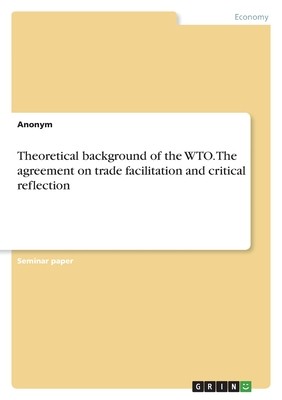
- We will send in 10–14 business days.
- Author: Anonym
- Publisher: GRIN Verlag
- Year: 2021
- Pages: 36
- ISBN-10: 3346427498
- ISBN-13: 9783346427496
- Format: 14.8 x 21 x 0.2 cm, minkšti viršeliai
- Language: English
- SAVE -10% with code: EXTRA
Theoretical background of the WTO. The agreement on trade facilitation and critical reflection (e-book) (used book) | bookbook.eu
Reviews
Description
Seminar paper from the year 2018 in the subject Economics - Other, grade: 2,0, SRH - Mobile University, language: English, abstract: The purpose of this paper is to outline the theoretical framework of the most popular economic theory approaches and the meaning of trade in general. As part of globalization nations are moving closer together and the importance and intensity of the cooperation between countries increases continuously. During this development transnational networks are getting an increasingly important role regarding the regulation and control of various areas of life such as economic relations, environmental issues, security and law. These transnational institutions are influencing technical standards and norms, they affect environmental-, consumption- and law standards and their power is gaining in importance. One of these bodies is the World Trade Organization (WTO) which was founded in the end of the 20th century with the purpose of creating a platform for negotiations about trade standards, regulating institutions in the trade sector and the development of multilateral agreements. The principles which underlain the work of the WTO include amongst others the subject of transparency, non-discrimination, and safety valves. With the evolution of a world ongoing getting more complex in trading subjects the facilitation, standardization and harmonization of global trade procedures get crucial and necessary for successful global growth. The implementation of the Agreement on Trade Facilitation (TFA) as the first multilateral agreement enforced in this context includes the establishment of global standards regarding customs and administrative measures and aims at the reduction of trading barriers and transaction costs in the future.
EXTRA 10 % discount with code: EXTRA
The promotion ends in 21d.03:52:55
The discount code is valid when purchasing from 10 €. Discounts do not stack.
- Author: Anonym
- Publisher: GRIN Verlag
- Year: 2021
- Pages: 36
- ISBN-10: 3346427498
- ISBN-13: 9783346427496
- Format: 14.8 x 21 x 0.2 cm, minkšti viršeliai
- Language: English English
Seminar paper from the year 2018 in the subject Economics - Other, grade: 2,0, SRH - Mobile University, language: English, abstract: The purpose of this paper is to outline the theoretical framework of the most popular economic theory approaches and the meaning of trade in general. As part of globalization nations are moving closer together and the importance and intensity of the cooperation between countries increases continuously. During this development transnational networks are getting an increasingly important role regarding the regulation and control of various areas of life such as economic relations, environmental issues, security and law. These transnational institutions are influencing technical standards and norms, they affect environmental-, consumption- and law standards and their power is gaining in importance. One of these bodies is the World Trade Organization (WTO) which was founded in the end of the 20th century with the purpose of creating a platform for negotiations about trade standards, regulating institutions in the trade sector and the development of multilateral agreements. The principles which underlain the work of the WTO include amongst others the subject of transparency, non-discrimination, and safety valves. With the evolution of a world ongoing getting more complex in trading subjects the facilitation, standardization and harmonization of global trade procedures get crucial and necessary for successful global growth. The implementation of the Agreement on Trade Facilitation (TFA) as the first multilateral agreement enforced in this context includes the establishment of global standards regarding customs and administrative measures and aims at the reduction of trading barriers and transaction costs in the future.


Reviews